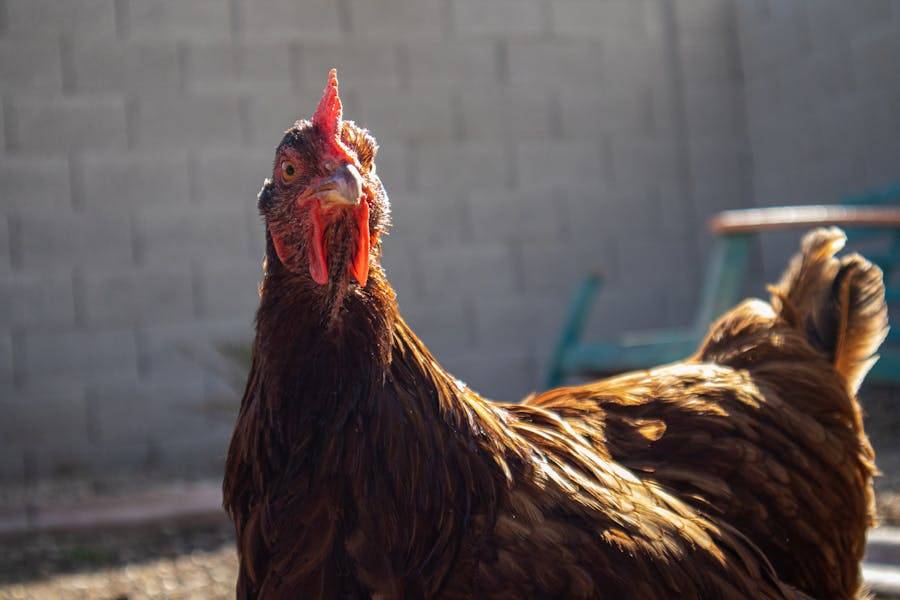Table of Contents
Chicken whistling, a unique sound different from the usual clucking and crowing, often raises eyebrows among poultry keepers.
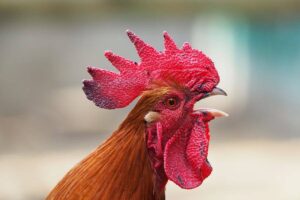
It’s important to understand what this sound means and how to respond to it.
This comprehensive guide will delve into the various reasons behind chicken whistling and the corresponding solutions to address each cause.
Understanding Chicken Whistling
What is Chicken Whistling?
Chicken whistling is a high-pitched sound produced by chickens, often resembling a whistle or a wheeze.
Different from the typical clucking, crowing, or squawking, this sound is usually an indication of certain issues that require attention.
Why Do Chickens Whistle?
Chickens primarily communicate through vocalizations, and whistling can be one of them.
However, if you notice your chicken whistling consistently, it could indicate several underlying issues like respiratory infections, environmental factors, stress, parasitic infestations, injuries, or breed-specific traits.
Let’s explore these causes in detail and look at their respective solutions.
Respiratory Infections
Identifying Respiratory Infections
Respiratory infections in chickens can cause various symptoms, including whistling or wheezing sounds.
These infections can be viral, bacterial, or fungal in nature, and each comes with its own set of signs.
Other than unusual vocalizations, you may notice nasal or ocular discharge, swollen eyes or face, coughing, sneezing, labored breathing, loss of appetite, or lethargy.
A change in egg production can also be indicative of an underlying health issue.
Treating and Preventing Respiratory Infections
If you suspect a respiratory infection, it’s crucial to consult with a vet for a proper diagnosis and treatment plan.
Depending on the cause of the infection, antibiotics or antifungal medications may be prescribed. It’s important to follow the treatment regime strictly and monitor your chicken’s progress closely.
Prevention is always better than cure – maintaining good coop hygiene, providing a balanced diet to boost your flock’s immunity, vaccinating your birds, and practicing quarantine protocols for new or sick birds can help prevent the spread of respiratory diseases.
Environmental Factors
Recognizing Environmental Causes
Environmental factors can play a significant role in causing a chicken to whistle. Poor ventilation can lead to a buildup of ammonia from chicken droppings, which can irritate the respiratory tract.
Dusty conditions or exposure to irritants like smoke, pesticides, or cleaning chemicals can also lead to respiratory distress, causing whistling or wheezing sounds.
Addressing Environmental Causes
Addressing environmental causes involves ensuring your coop has proper ventilation to prevent harmful gas buildup.
Regular cleaning of the coop and bedding can help minimize dust and maintain a healthy environment.
Avoid using harsh chemicals or pesticides around your chickens. Instead, opt for natural or chicken-safe alternatives.
If your coop is in a noisy or high-traffic area, consider relocating it to a quieter, less disturbed part of your yard to minimize stress.
Stress or Fear

Understanding Stress-Induced Whistling
Stress or fear can be a significant factor in causing a chicken to whistle.
Changes in the environment, such as introducing new chickens, changes in the pecking order, predator threats, or even sudden loud noises, can induce stress in chickens.
Bullying from other chickens can also be a source of stress.
Alleviating Chicken Stress
Identifying and eliminating sources of stress is crucial in alleviating stress-induced whistling. If introducing new birds, do so gradually and monitor the flock dynamics closely.
Provide ample space for your chickens to prevent overcrowding and reduce bullying. Install predator deterrents to keep your flock safe.
Regular handling and interaction can also help your chickens feel more comfortable and secure.
Parasitic Infestations
Detecting Parasites in Chickens
Parasitic infestations, such as mites, lice, or worms, can cause discomfort and stress to your chickens, potentially leading to whistling.
Apart from unusual sounds, you may notice changes in their behavior, such as constant preening, restlessness, or decreased activity.
Physical signs might include loss of feathers, redness, swelling, or visible parasites on the chicken or in the coop.
Dealing with Parasites
Regular deworming and pest control measures can help manage parasitic infestations.
Over-the-counter treatments are available, but for severe infestations or if you’re unsure about the type of parasite, consult with a vet for appropriate treatments.
Preventive measures include maintaining a clean coop, rotating free-range areas, and regularly checking your chickens for signs of parasites.
Injury or Trauma
Identifying Injury-Related Whistling
Physical injuries or trauma to the body or the respiratory tract can cause a chicken to whistle. Visible injuries, limping, changes in behavior, or decreased activity can be signs of physical trauma.
Treating and Preventing Injuries
Minor injuries can be treated with first aid, but serious ones require veterinary attention. Ensure the coop and run are safe and free from hazards that can cause injury.
Regular health checks can help identify and treat injuries before they become severe.
Breed-Specific Characteristics
Understanding Breed-Related Whistling
Some chicken breeds, particularly those with unique physical characteristics like short beaks or crests, may be more prone to whistling due to anatomical differences.
This type of whistling is usually not a cause for concern unless accompanied by other signs of distress or illness.
Managing Breed-Specific Whistling
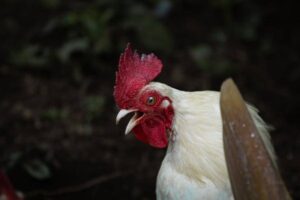
If the whistling is breed-related and not causing distress to the chicken, it’s usually nothing to worry about.
However, if you notice any signs of discomfort, difficulty breathing, changes in behavior, or decreased egg production, it’s best to consult a vet.
Regular health checks and understanding your breed’s specific needs can help manage breed-specific issues effectively. Nutritional Deficiencies
Recognizing Nutritional Deficiencies
Nutritional deficiencies can also lead to whistling in chickens. A lack of essential nutrients or an unbalanced diet can affect a chicken’s overall health, including its respiratory system.
Symptoms might include decreased appetite, slow growth, poor feather condition, or changes in egg production.
Addressing Nutritional Deficiencies
Providing a balanced diet is crucial for your chickens’ health. Commercially prepared chicken feeds usually contain a good balance of nutrients needed by chickens.
Supplementing their diet with fruits, vegetables, and grit can also help ensure they get all the necessary vitamins and minerals.
If you suspect nutritional deficiencies, it might be worth consulting with a vet or a poultry nutritionist for advice on dietary adjustments.
Age-Related Factors
Understanding Age-Related Whistling
Just like humans, chickens can develop age-related conditions that can cause whistling. Older chickens may have weaker immune systems, making them more susceptible to infections.
They might also have worn-out respiratory systems due to age, leading to sounds like whistling when breathing.
Managing Age-Related Whistling
Regular health checks become even more important as your chickens age. Monitor your older chickens closely for any changes in behavior, appetite, or egg production.
Provide them with a comfortable living environment and consider separate housing if younger birds are causing stress or injury.
Regular vet check-ups can help detect and manage age-related conditions early.
Conclusion
Understanding why your chicken is whistling and knowing how to respond are crucial parts of responsible poultry keeping.
While this guide provides comprehensive insights, remember that each chicken is unique, and what works for one might not work for another.
Always monitor your chickens’ health and behavior closely, and don’t hesitate to seek professional help when necessary.

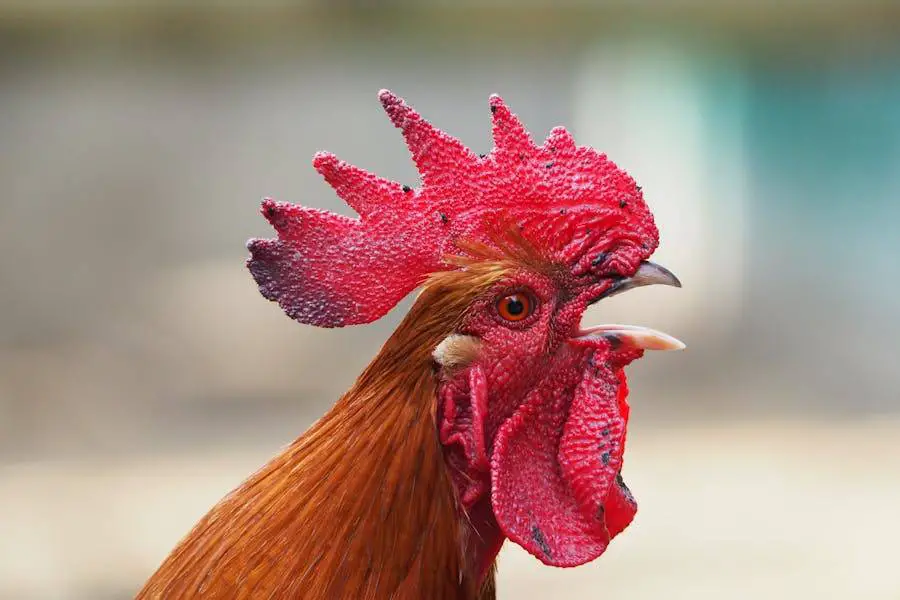
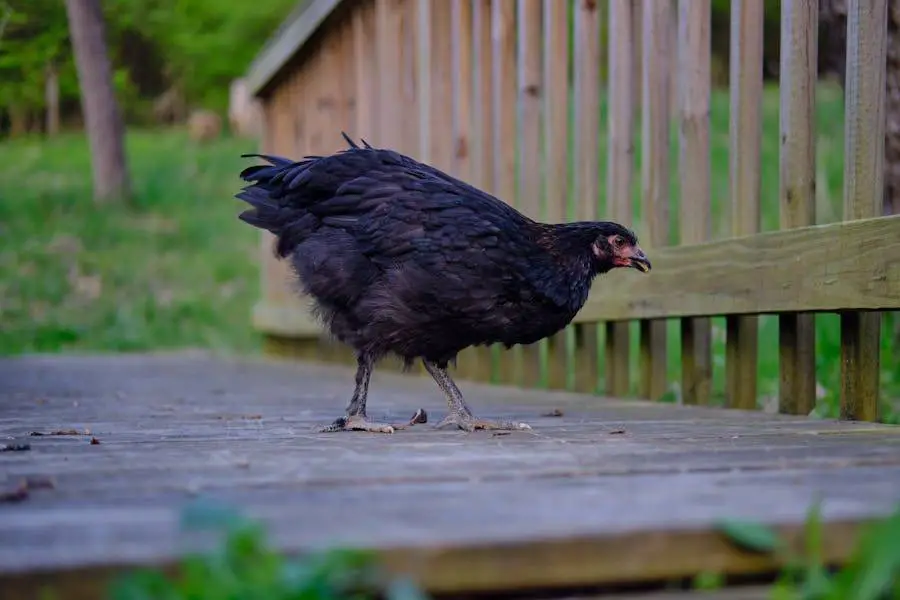


![Screws or Nails for Framing - Which Should I Use? [Guide] Screws or Nails for Framing - Which Should I Use? [Guide]](https://homesteadandprepper.com/wp-content/uploads/2021/10/Nails-or-screws-for-framing-150x150.jpg)



